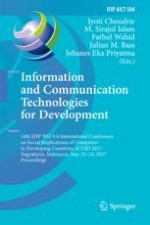This book constitutes the refereed proceedings of the 14th IFIP WG 9.4 International Conference on Social Implications of Computers in Developing Countries, ICT4D 2017, held in Yogyakarta, Indonesia, in May 2017.
The 60 revised full papers and 8 short papers presented together with 3 keynotes were carefully reviewed and selected from 118 submissions. The papers are organized in the following topical sections: large scale and complex information systems for development; women empowerment and gender justice; social mechanisms of ICT-enabled development; the data revolution and sustainable development goals; critical perspectives on ICT and open innovation for development; the contribution of practice theories to ICT for development; agile development; indigenous local community grounded ICT developments; global sourcing and development; sustainability in ICT4D; and information systems development and implementation in Southeast Asia. Also included are a graduate student track, current issues and notes.
